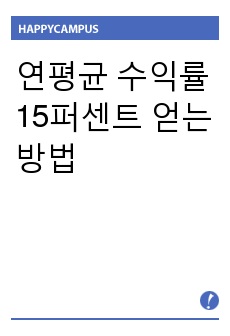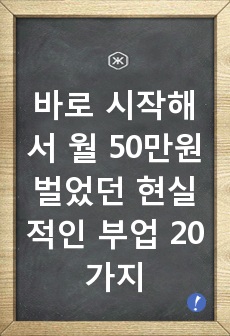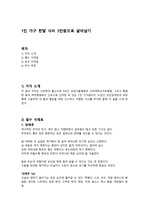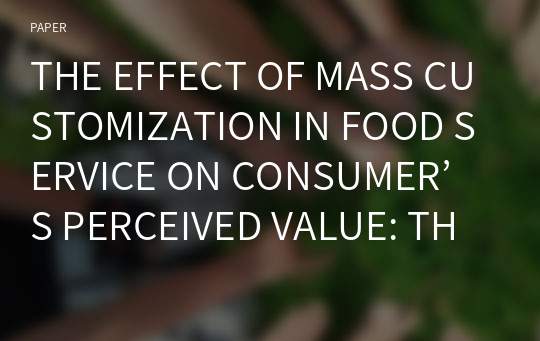THE EFFECT OF MASS CUSTOMIZATION IN FOOD SERVICE ON CONSUMER’S PERCEIVED VALUE: THE MODERATING ROLE OF SOCIAL INFLUENCE AND FOOD TYPES
* 본 문서는 배포용으로 복사 및 편집이 불가합니다.
서지정보
ㆍ발행기관 : 글로벌지식마케팅경영학회(GFMC)
ㆍ수록지정보 : Global Marketing Conference
ㆍ저자명 : Jaewon Hwang, Yong-Ki Lee
ㆍ저자명 : Jaewon Hwang, Yong-Ki Lee
영어 초록
IntroductionIn recent times, mass customization strategy has been actively adapted even in the food service industry, which provides services wherein consumers select the main ingredients of the food they order according to their preference. In this study, we examine the effect of mass customization strategies perceived by consumers in the food service industry. We also includes the external and internal environmental factors stimuli surrounding the situation of purchasing customized food items to better predict how consumer’s perceived value of mass customization might be formed within the context of service industry. Evidence shows that consumers’ perceived value is high for mass customization in food consumption service compared to food service for a fixed menu. The findings further suggest that this effects of mass customization on consumer perception is moderated by social influence (group vs. individual) and food type (utilitarian vs. hedonic).
Theoretical Development
Recent research in the field of mass customization has demonstrated that the advantage of designing consumer’s own products is in increasing consumer's perceived benefits while engaging in the customization of tangible products. These studies have shown that the mass customization provides consumers with a utilitarian value due to the purchase of optimized products that meet their individual needs and various values that are embedded in the customization process, such as hedonic value, self-expressive value, and creative achievement (Merle, Chandon, Roux, & Alizon, 2010; Yoo & Park, 2016), and that this value recognition leads to positive attitudes and behavioral responses such as high willingness to pay (Franke, Keinz, & Steger, 2009; Schreier, 2006), purchase intent, and loyalty (Yoo & Park, 2016). However, whereas research on mass customization focusing on tangible products has been actively conducted, research in the field of intangible services, is still lacking in two respects. First, there has been very little discussion of the effectiveness of mass customization strategies in the food service industry. Specifically, based on the stimuli-organism-response (S-O-R) framework, which states that environmental stimuli (S) lead to the formation of a customer perception (O) that induces consumers’ behavioral responses (R) (Mehrabian & Russell, 1974), existing research focused on the relationship of customer’s behavioral response to mass-customized food service (S-R relationship) (Kuo & Cranage, 2010; Wolf and Zhang, 2016), failing to embrace S-O relationship that focuses on how mass customization differs from a standard system in terms of how consumers perceive value. Considering that mass customization services can be regarded as a form of customer engagement strategy (Chathoth et al., 2014; Chathoth et al., 2016), it can be assumed that mass customization in services can induce positive consumer perception. Second, little research has yet examined situational factors that affect consumer response in purchasing mass customization of products/service. Considering that service environments play a significant role in service delivery by strengthening customer perceptions and retention (Baker, Parasuraman, Grewal, & Voss, 2002; Sherman, Mathur, & Smith, 1997), it is necessary to identify the internal and external environmental factors that limit or enhance consumers’ perceived value of the mass customization for effective implementation of the mass customization strategy. The aim of the present research is to empirically examine the effects of mass customization on consumer responses. It is hypothesized that consumers’ perceived value might be high for mass customization in food consumption service (compared to food service for a fixed menu) (H1), which is consistent with previous literature on consumer responses to mass customization in tangible. Furthermore, the current research further includes various environmental stimuli surrounding the situation of purchasing customized food items to better predict how consumer’s perceived value of mass customization might be formed within the context of service industry. Based on the assumption that (a) people's choice of consumption is affected by the expectations of how others evaluate their decisions (Ariely & Levav, 2000; Calder & Burnkrant, 1977) and that (b) consumers are more concerned about social norms and therefore make similar choices to blend in resulting in uniformity at the group level (Tice, Butler, Muraven, & Stillwell, 1995), it is expected that consumers sometimes feel compelled to refrain from choosing favorites because of how they expect to be perceived by others, hindering consumer’s benefits of mass customization. In addition, there are two food types based on the goal of consuming food: utilitarian food and hedonic food (craving for sweetness, e.g., desserts) (Wansink, Ittersum, & Painter, 2004; 2005). In pursuing the hedonic goal, the consumer tendency to engage in various behaviors is strengthened by the desire to express one’s personality to others (Ariely & Levav, 2000; Ratner & Kahn, 2002). Accordingly, in the present research, we explore the perceived value of mass customization moderated by social influence (H2), and food type (H3). In this model, social influence (group vs. individual), which is the factor outside the scope of customizing process, is regarded as an external variable and food types (utilitarian vs. hedonic), divided according to the purpose of food consumption, as an internal variable.
Method
We used a 2 (customization: low vs. high) × 2 (social influence: individual vs. group) between subject experiment conducted on the subjects regarding two types of food service: utilitarian food (main course) and hedonic food (dessert). We assigned 208 participants randomly to one of four conditions. Participants were asked to imagine they were visiting the high customized restaurant with their colleague together (vs. alone) that provide high customized service (vs. low customized service) and saw a menu for a food item. Modified from Kuo and Cranage (2010) study, two level of customized menu scenarios were used in this study. In the high customization scenario, participants are told that they were in a restaurant where they were offered to customize their dishes with choices of ingredients. In the low customization condition, participants were told that they were in a restaurant where they ordered among fixed menu items. Based on pretest result, we used pasta, which is entrée for the utilitarian food, and use ice-flake, which is dessert for the hedonic food. After reading the scenario, participants provide their perceived value of mass customization ratings of the service process.
Results and Conclusion
First, an analysis of variance (ANOVA) revealed a significant effect of mass customization demonstrating that on perceived value, participants who read mass customization service condition had a higher perceived value on their food than participants in the fixed menu condition (H1). Second, in order to examine whether social influence (H2) and food type (H3) moderate the effect of mass customizatino on consumer perceptions, a moderated moderation model was performed a bootstrapping procedure with 5000 samples using the PROCESS model 3 (Hayes, 2016). The result revealed a significant three-way interaction effect among level of customization (high vs. Low), social influence (group vs. individual), and food types (utilitarian vs. hedonic). As the level of customization increases, the overall perceived value increases; however, it is confirmed that, when making decisions about food in a group situation, there are restrictions on perceiving the value that the consumer can customize and feel as compared to the individual situation. Finally, impact of social influence on the perceived value of customization is moderated by food type (hedonic vs. utilitarian). In other words, in hedonic food consumption situation, the modeartion effect of social influence on the perceived value of customization is weakened. Consumers are more likely to appreciate the process and consider it more palatable when they use mass customization service in restaurant. However, when people are conscious of the presence of others, the act of selecting food ingredients according to one’s own preference is restricted. Therefore, even if customized food is ordered in the presence of the group, its perceived value will be as lower than that of a fixed menu. In addition, when people use mass customization service in hedonic food consumption situations, regardless of group influence, they perceive that the value of customized menu is higher than that of the fixed menu. We expect that the study findings and framework will provide practical and theoretical implications such as the development of theories on food service situations, as well as aid restaurants in establishing marketing strategies. In addition, identifying internal and external environmental factors that limit consumers’ perceived value of mass customization will enable restaurants to find a suitable menu composition method to enhance and maintain customers’ perceived value and build a promotional strategy accordingly.
참고 자료
없음"Global Marketing Conference"의 다른 논문
 THE ROLES OF GREEN PACKAGING IN UGLY FOOD PURCHASE INTE..22페이지
THE ROLES OF GREEN PACKAGING IN UGLY FOOD PURCHASE INTE..22페이지 THE IMPACT OF INDUCED AWE ON ETHICAL TOURIST BEHAVIORS5페이지
THE IMPACT OF INDUCED AWE ON ETHICAL TOURIST BEHAVIORS5페이지 A BIBLIOMETRIC ANALYSIS OF SPIRITUAL TOURISM RESEARCH15페이지
A BIBLIOMETRIC ANALYSIS OF SPIRITUAL TOURISM RESEARCH15페이지 SOCIAL NETWORK ANALYSIS AND RESPONSE TIME TESTING: CONS..11페이지
SOCIAL NETWORK ANALYSIS AND RESPONSE TIME TESTING: CONS..11페이지 THE EFFECTS OF PARA-SOCIAL INTERACTION ON ONLINE CELEBR..3페이지
THE EFFECTS OF PARA-SOCIAL INTERACTION ON ONLINE CELEBR..3페이지 THE INFLUENCE OF OPINION LEADERS ON DAILY DEALS USER’S ..3페이지
THE INFLUENCE OF OPINION LEADERS ON DAILY DEALS USER’S ..3페이지 HOW IMMERSIVE RETAILING AFFECTS CONSUMERS’ URGE TO BUY:..6페이지
HOW IMMERSIVE RETAILING AFFECTS CONSUMERS’ URGE TO BUY:..6페이지 KEY TO SUPERSTARDOM IN A GLOBALISED MARKET: THE ROLE OF..6페이지
KEY TO SUPERSTARDOM IN A GLOBALISED MARKET: THE ROLE OF..6페이지 A POST-PANDEMIC LOOK AT TOURISTS’ PERCEIVED COOLNESS OF..4페이지
A POST-PANDEMIC LOOK AT TOURISTS’ PERCEIVED COOLNESS OF..4페이지 EXTRACTING OFFLINE RETAIL SHOPPING PATTERNS: OLLABORATI..5페이지
EXTRACTING OFFLINE RETAIL SHOPPING PATTERNS: OLLABORATI..5페이지

























